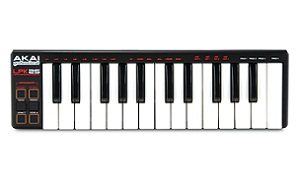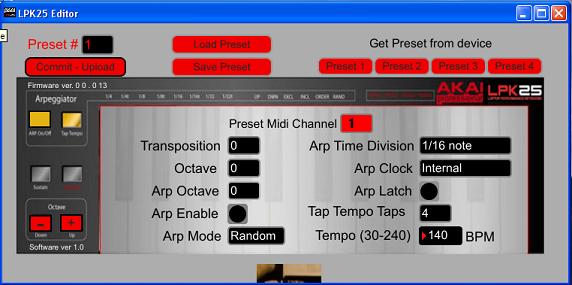Review: AKAI Pro LPK 25 surpasses its small stature in sound
(ShackMan | Posted 2010-09-10)

Unpacking the Akai LPK25 felt like unpacking a brand new Transformers action figure. While it's not much by itself, it's another cool piece to add to the collection. Akai's 25-key Laptop Performance Keyboard feels comfortable in my hands, and at about the size of a melodica and the weight of a pencil, portable becomes an understatement. There isn't any wall wart or plug in of any sort for the LPK-25 either. It's entirely USB powered, so setting it up with your laptop live is essentially wireless, apart from, obviously, the USB connection. All it takes to get up and running is installing the LPK Editor, a program which takes up next to no room on your computer's hard drive. The manuals are included on the CD as well, so I got started right away.
Before I get into it, I should mention that the Quick Start Guide assumes that you as a user already know what to do with a product like the LPK25, so I'll give a quick explanation for the newcomers. You'll need a DAW such as Reason, Logic, or even composition software like Finale or Sibelius (it even works with PowerTab if you can tweak the settings just right). Either way, you need software from which you can pull MIDI presets to use with the keyboard. I had no troubles installing or configuring the editor or getting the keyboard to work with my software. Everything was immediately recognized on both my Windows XP and Windows 7 systems as well as a Macbook Pro.

The editor (shown above) is easy to understand and use. Every single variable is laid out clearly for the user, although I will grant that there aren't many available in the first place. That said, at a $70 price tag, I think it's plenty. We get four presets which are infinitely changeable and can be molded easily enough live simply by keeping whatever program you use running and editing from within the program. Once I had everything programmed in Ableton or Logic, I quickly realized that the paramaters in the LPK25 editor were all I really needed from then on. It does exactly what it needs to do, and the on board arpeggiator and tap tempo controls are gravy, too.
Notice the “Load Preset” and “Save Preset” commands on the editor. The LPK's editing software can also be used to move patches from computer to computer like a mini storage device for your sounds. Also, while you're limited to 4 patches at one time, it's perfectly easy to load up a new set of patches for the next song in just a few clicks, and there are next to no load times in any aspect of the program, making the LPK a gem to use in a live setting. Where AKAI didn't make their editor look quite as flashy or colorful, they gained in speed and a good solid layout. I'll take the latter any day.
Now the keyboard itself also features six control buttons including the aforementioned arpeggiator and tap tempo control. These include a sustain button, a program change button (which allows quick live changes through holding the program button and pressing one of the 25 keys), and octave down and up buttons. I didn't find myself wishing for anything else other than a volume control somewhere on the unit or the editor, especially since most laptops have a combination of button presses to increase or decrease volume, rather than a knob or slider. I don't need anything fancy, but the simplest plastic scroll would suffice for me.
The keys, last but certainly not least, feel a lot better than they look. The feel was one of my first concerns upon opening up the packaging. They looked small and hardly weighted enough to remotely feel like a decent keyboard, but the little LPK25 surprised me with a long throw distance on each key for its size and enough resistance to feel a note being produced. I didn't have any problems with mashing more than one key at a time either, and in fact the keys are not that much smaller than a traditional synthesizer size. It looks like it shouldn't be as smoothly playable as it is, and I felt at home on it live and in the studio.
For zero load times, no frills construction on both hardware and software, surprisingly playable feel, and trouble free installation and configuring, AKAI's LPK25 is awarded 5 out of 5 stars and, for portability and light weight, sits largely in a class of its own. However, the lack of easy volume control drops that rating by ˝ of a star. 4.5 stars isn't bad in the long run by any stretch, and I'm by no means easy on gear, but this little guy surprised me. For $70 street, it's worth checking out for anyone already running any controller software.
James Rushin is a bassist, keyboardist, writer, and composer living and working in the Greater Pittsburgh area. He has performed with Selmer artist Tim Price, Curtis Johnson, guitarists Ken Karsh and Joe Negri. His compositions have been featured at West Virginia University and Valley Forge Christian College. He will be spending the Fall and Winter months working on a full-length album with his latest project, Shutterdown.
Feel free to e-mail James with comments, questions, concerns, at james.rushin@musicgearreview.com




